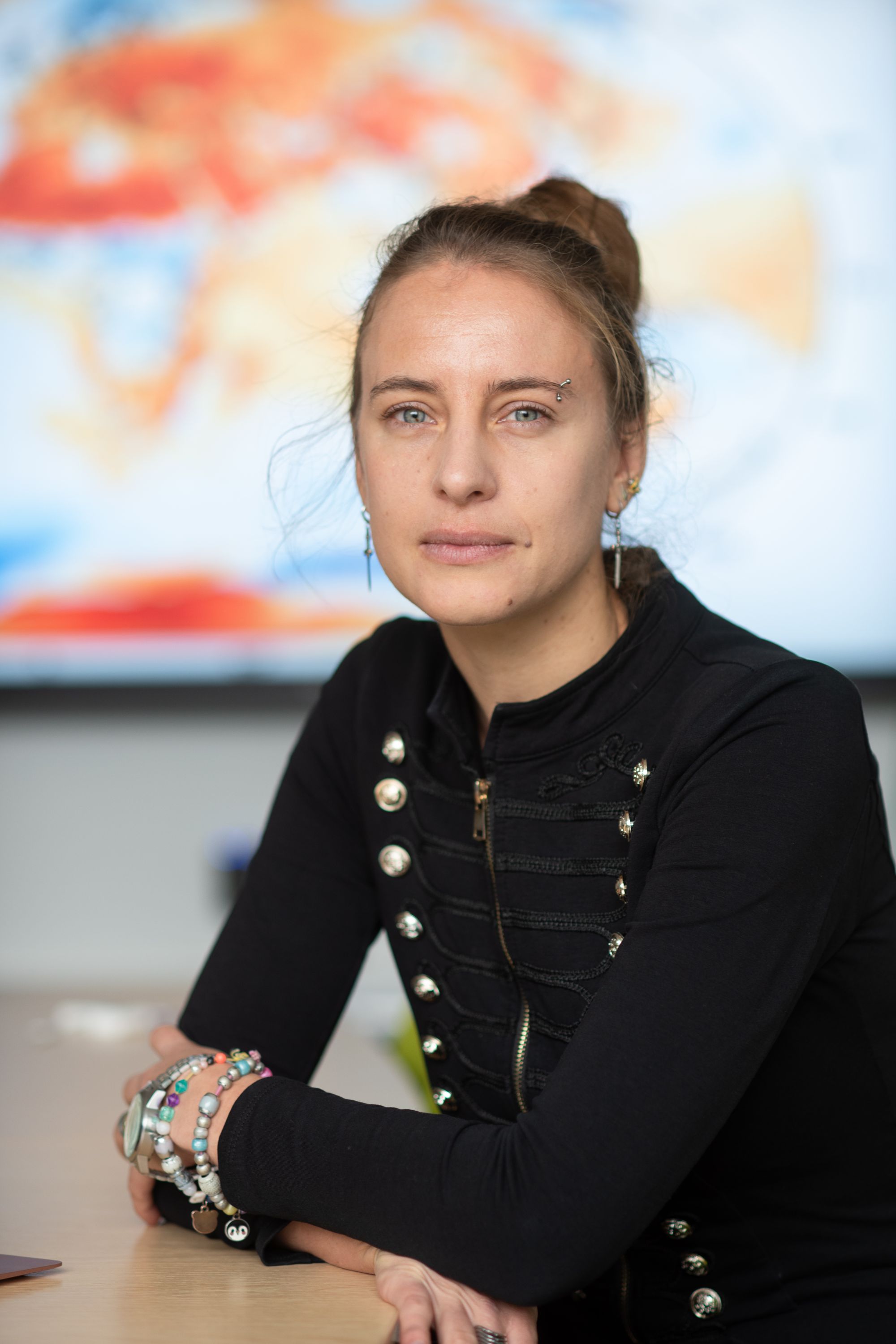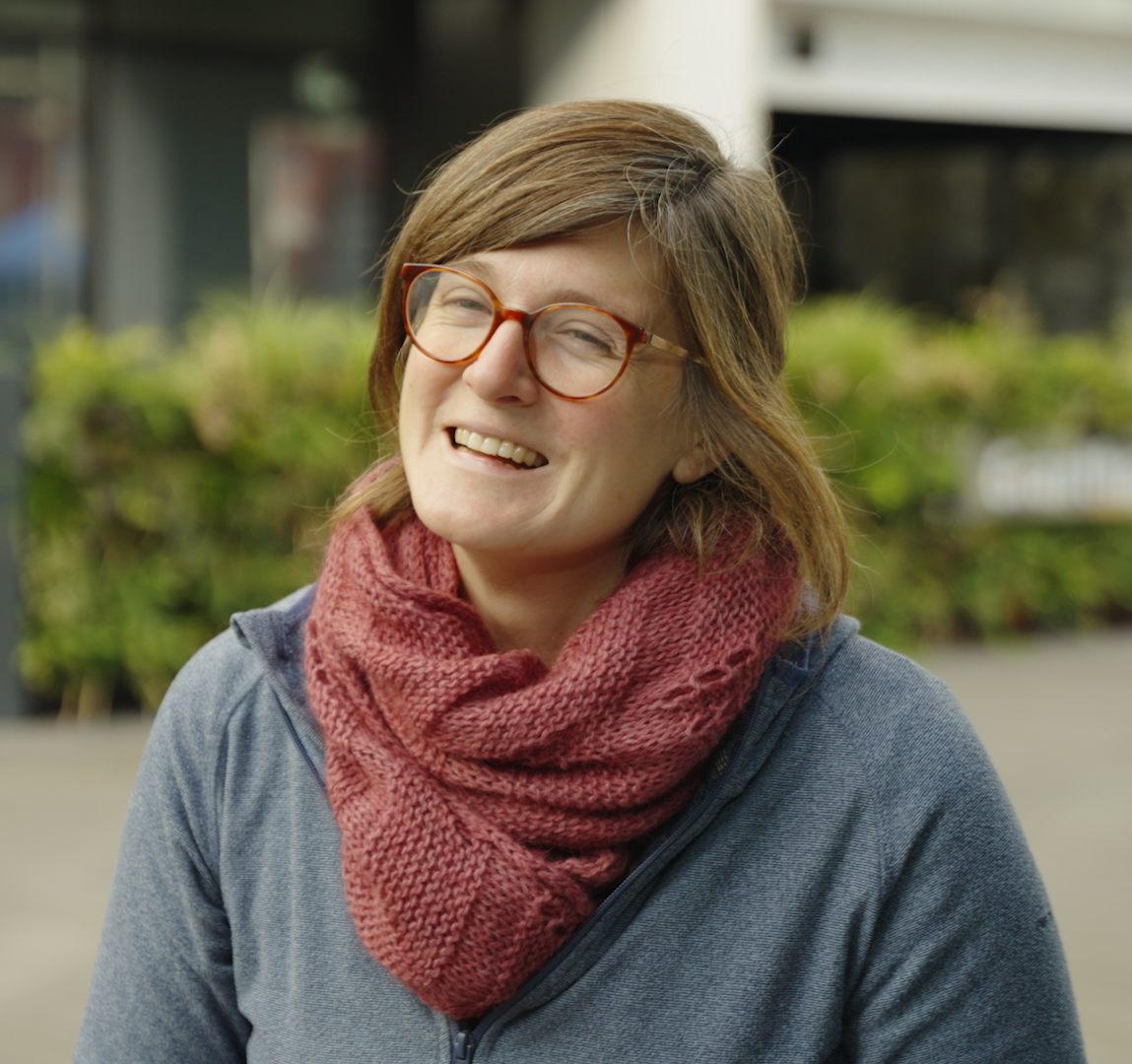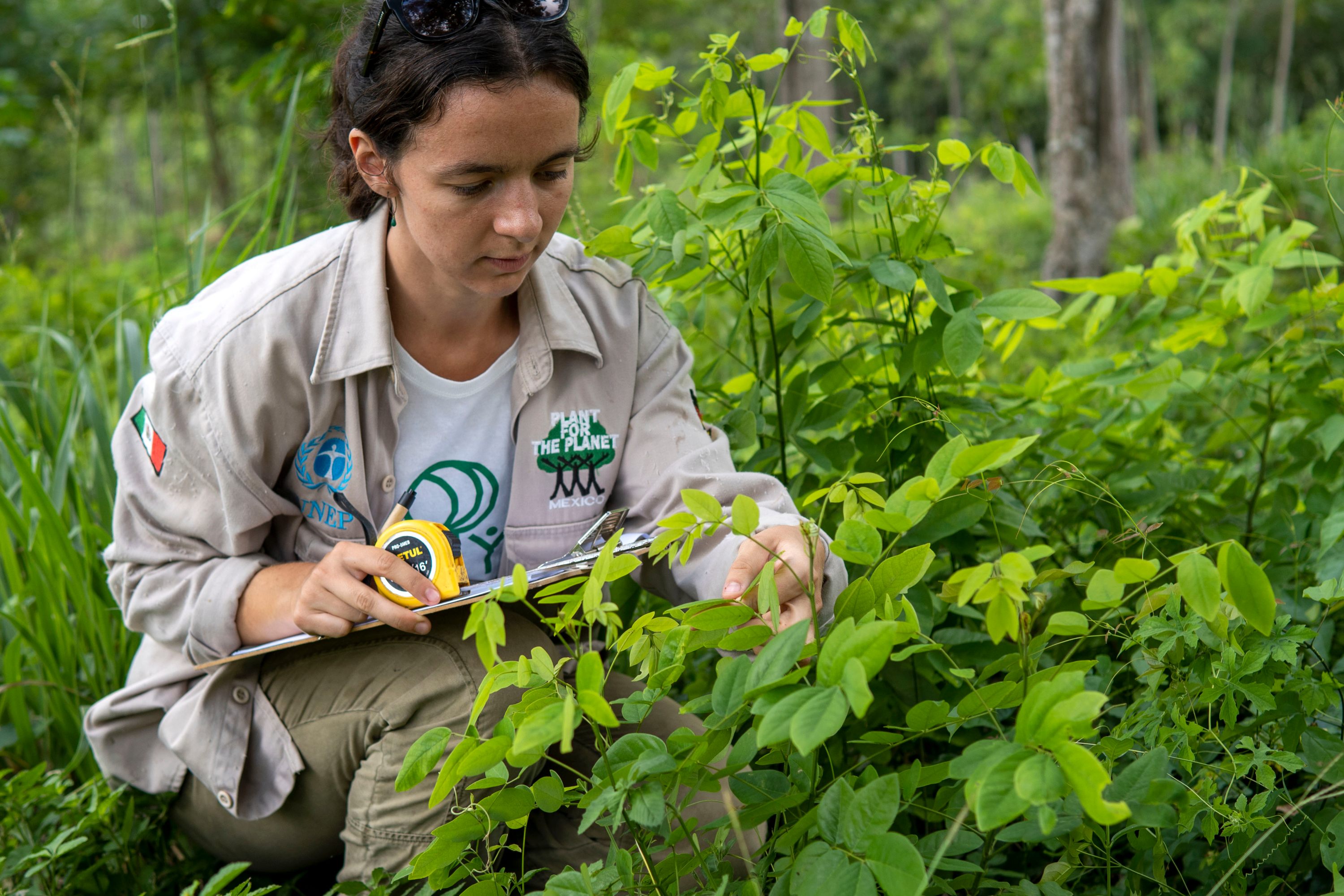 [Image: Dr Jenna Lawson and her team studying spider monkeys in the Corcovado National Park, Costa Rica (c) Dr Jenna Lawson]
[Image: Dr Jenna Lawson and her team studying spider monkeys in the Corcovado National Park, Costa Rica (c) Dr Jenna Lawson]
Imperial College London is a world-leader in climate change research, and uniquely placed to deliver the scientific, technological and policy solutions we need to make our zero emissions and zero pollution vision a reality.
We pioneer a multi-disciplinary approach to global problem-solving. Our research is transforming manufacturing, attitudes to consumption and economic practices. It is revealing the impact of pollution on human health, and how to mitigate it. We are driving advances in sustainable energy sources, electric vehicles and fuel cells; tackling water scarcity and ocean plastics; improving air quality; and helping to ensure food security and climate resilience across the world.
We do things differently. We transcend traditional fields, bringing together researchers across Imperial and forging new approaches that converge disciplines – from fundamental science and engineering to systems thinking, human health, new business models, and policymaking. We support the rapid translation of ideas into new sustainable products, services and companies, through our rich entrepreneurial ecosystem and our support of innovation, translation and entrepreneurship.
The College is reshaping its research portfolio to support our sustainability goals. Our research covers a range of areas, with impact on society and policy at the heart of everything we do.
Impact and influence
- Profile: Research Associate, Department of Life Sciences, Silwood Park
- Which extreme weather events are caused by climate change?
- Linked: climate change, biodiversity and nature
- Retrofitting our homes to tackle multiple crises
- Ones to watch
 The forests of Costa Rica and the woodlands of Berkshire may not seem connected, but for Dr Jenna Lawson, both have provided a home for her research.
The forests of Costa Rica and the woodlands of Berkshire may not seem connected, but for Dr Jenna Lawson, both have provided a home for her research.
Dr Lawson spent much of her PhD working in Costa Rica’s Corcovado National Park, where she used passive acoustic monitoring to better understand the songs of the spider monkey, research that helps effectively protect and manage vulnerable rainforest species.
When in the UK, she was based at Imperial’s Silwood Park Campus. The Berkshire site was founded in 1947 as a biology field station and now houses a large graduate community of some 150 students, many from overseas. The Campus celebrated its 75th anniversary in 2022.
For Dr Lawson, the campus is a special place to work. She explains: “The small scale and sense of community are so important, and the immediate access to natural land is also a huge advantage in terms of testing field equipment. Everyone knows absolutely everyone, and you get to meet amazing researchers at the top of their respective fields.”
Dr Lawson is building on her PhD research with a post-doctoral project in the Department of Aeronautics, using robotics to improve acoustic sensing techniques. She will return to Costa Rica in 2023 to apply her findings to improving conservation efforts there.
READ MORE: Silwood Science shines at 75th Anniversary flagship celebration
WATCH: Silwood Park 75th Anniversary Alumni Event 2022
 Whenever extreme weather events occur, the media and decision-makers ask to what extent they are influenced by climate change. Scientists from the Grantham Institute are working on the answers.
Whenever extreme weather events occur, the media and decision-makers ask to what extent they are influenced by climate change. Scientists from the Grantham Institute are working on the answers.
Dr Friederike (Fredi) Otto (pictured), Dr Mariam Zachariah, Dr Clair Barnes and postgraduate researcher Frederick Fabian focus their research on extreme weather events such as droughts, heatwaves and storms. They want to understand whether, and to what extent, these are made more likely or intense due to climate change – known by experts as ‘attribution’.
Much of their work is carried out as part of World Weather Attribution (WWA), an international collaboration of experts led by Dr Otto, who come together to carry out rapid assessments in the days following the most extreme events.
Their recent reports have shown that climate change made a deadly heatwave in India and Pakistan 30 times more likely to occur, and flooding in Niger, Nigeria and Chad 80 times more likely. However, the team also showed that climate change was not to blame for droughts and a food crisis in Madagascar, where the main drivers were poverty, COVID-19 and vulnerability in the population.
The team value making their expertise available to a wider audience. Dr Otto and Dr Zachariah appeared on the BBC News Channel’s Weather World, to explain the impact that climate change had on the UK’s 2022 summer heatwaves. But while their work tends to make headlines when it concludes that climate change does have an impact, the opposite result can be even more useful to regions facing disaster.
Dr Otto feels that WWA has helped to change the global conversation around climate change. She says: “By delivering timely evidence that is trusted by scientists and policymakers we are influencing how governments plan to adapt to the coming environmental changes and paving the way for legal action against fossil fuel companies.”
The work of WWA has shown that climate change...
- ...made the 2022 Northern Hemisphere droughts 20 times more likely
- ...made the 2022 UK heatwave more intense and at least 10 times more likely
- ...added $4bn to the damage caused by Japan's Typhoon Hagibis in 2019
MEDIA COVERAGE: The Guardian profile and news article, and WIRED profile
RESEARCH NEWS: Browse our news stories covering WWA reports
Biodiversity loss and climate change are two of the biggest and most urgent threats facing human society worldwide. Human activities drive both crises, but they also fuel one another and are often governed in separate ways.
A new Grantham Institute briefing paper by Imperial’s Galina Jönsson and Professor Andy Purvis, who has a joint role at London’s Natural History Museum, explains how the two crises are linked, and how an integrated approach is essential for a thriving people and planet.
Strategies to tackle climate change are not always good for biodiversity. Postgraduate researcher Galina explains: “Solutions that tackle both challenges simultaneously do exist, but we need a re-think of current environmental policy, planning and practice.
“Any integrated approach will require large-scale restoration of degraded ecosystems, protection of existing habitats and reduction of demand for natural resources, supported by policy measures that address the primary socioeconomic drivers.
“With the participation of local people, societies can adapt to and mitigate climate change while boosting biodiversity. Together we can find solutions that work for people, wildlife and the planet.”
READ MORE: Briefing: The interactions between biodiversity and climate change
 In the United Kingdom and beyond, people are facing multiple crises in energy, housing, climate change, cost of living and health. Dr Kate Simpson (pictured) believes that a strategy to retrofit homes is one of the best ways to lower energy costs, tackle climate change, and keep everyone warm and healthy.
In the United Kingdom and beyond, people are facing multiple crises in energy, housing, climate change, cost of living and health. Dr Kate Simpson (pictured) believes that a strategy to retrofit homes is one of the best ways to lower energy costs, tackle climate change, and keep everyone warm and healthy.
UK homes are the most inefficient in Europe, while one third of greenhouse gas emissions come from energy generated for homes. Last year, over 4 million families were living in fuel poverty. ‘Retro-fitting’ a building can include insulating the loft and walls to prevent heat loss, replacing a gas boiler with an efficient electric heat pump, and installing solar panels with a battery to store cheap and clean electricity when it is available.
Dr Simpson explains: “We urgently need a long-term strategy and policy to retro-fit the UK’s housing stock – one that includes everybody. Without further action we will see an increase in cold-related deaths and illness. Ultimately, the more energy efficient homes we have, the fewer people will be in this situation.”
READ MORE: Decarbonising buildings: Insights from across Europe
WATCH: Retrofit our homes to tackle multiple crises says Dr Kate Simpson
 1. As part of her PhD, Science and Solutions for a Changing Planet (SSCP) DTP postgraduate researcher Anna Gee (pictured) is working with international charity Plant-for-the-Planet to help regrow forests on degraded agricultural land on the Yucatán peninsula in Mexico. Her research aims to untangle what leads to tree diversity in tropical dry forests. In areas that have been impacted by human activity, regenerating or planted forests may lack the features of more intact forests that naturally promote tree diversity. Anna hopes to use the results of her work to inform best practice for promoting resilience and longevity in forest restoration.
1. As part of her PhD, Science and Solutions for a Changing Planet (SSCP) DTP postgraduate researcher Anna Gee (pictured) is working with international charity Plant-for-the-Planet to help regrow forests on degraded agricultural land on the Yucatán peninsula in Mexico. Her research aims to untangle what leads to tree diversity in tropical dry forests. In areas that have been impacted by human activity, regenerating or planted forests may lack the features of more intact forests that naturally promote tree diversity. Anna hopes to use the results of her work to inform best practice for promoting resilience and longevity in forest restoration.
2. Nearly two billion people globally rely on mountain water for drinking and irrigation, but this water source is under threat from climate change. A collaborative project between UK and Peruvian researchers is studying the impact that shrinking glaciers have on the availability of water in the Peruvian Andes. Professor Wouter Buytaert and his team have shown how strategies that include scientists working on the ground directly with communities could help them drive their own climate adaptation and boost water security.
3. Postgraduate students on the SSCP DTP will receive training from outreach experts in the UK-wide Real World Science network of museums. Created in partnership with London's Natural History Museum and the Grantham Institute, the two-day course will link local issues and artefacts to environmental and climate change. SSCP DTP researcher Eloise Hunt says: “There's no other course like this so I can't wait to see how we can all use this training in the future!”
Contact us
Email us at: grantham@imperial.ac.uk
Phone us on: +44 (0)20 7594 9666
Privacy Notice
View the Grantham Institute Privacy Notice.